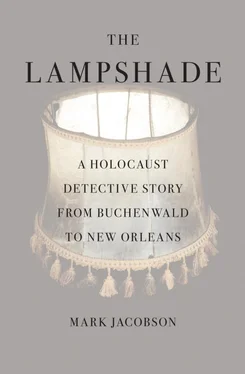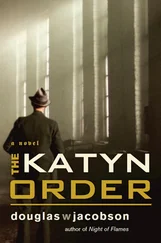But as for C. D. Jackson holding up a human pelvis that day at Buchenwald, Rosenberg said this was news to him. As far as he knew, there was no way the Buchenwald Table, with the lampshade sitting on it, was a PWD operation.
“The Table was set up by the prisoners themselves, the Communists. Those kapos! Who knows how many people they killed! They had their own agenda. Obviously the lampshade had propaganda value, but it wasn’t our propaganda.”
Rosenberg’s wife, Lourdes, was home now. A cheerful woman who looked to be at least twenty-five years younger than her husband, Lourdes met Rosenberg when he was teaching at the University of Texas at El Paso. They fell in love and married.
“That’s the worst thing about being so damn old,” Rosenberg said, “Lourdes having to take care of me all the time. She deserves better.”
Lourdes, who sets up school programs in both El Paso and across the border in teeming Ciudad Juárez, thought this was ridiculous. “You take care of yourself,” Lourdes said. “Besides, Albert has been very good for me. Once I was a poor Mexican girl. Now, thanks to Albert, I am a great European intellectual,” she joked.
Later Lourdes told me, “Albert suffers, you know. He likes to joke. He has a dark sense of humor. I think he does it to protect himself, because he has those dreams. Sometimes I’d wake up and he’d be banging against the wall or throwing the pillows around, in his sleep. Sometimes he’d throw me around in his sleep. He has so much he can’t talk about. So many people he knew were killed.”
For now, Lourdes looked at the picture of the lampshade with a sense of duty. “Is this like the one you saw at the camp, Albert?”
“Cuál?”
Lourdes shot Rosenberg a stern glance. “The one on the desk of the commandant.”
“Could be. It is very similar. It is not unattractive, I think. Maybe we could use an extra fixture.”
Lourdes had had enough of this and excused herself, giving Rosenberg a peck on the top of his bald head.
“She’ll probably ask the Virgin to forgive me now,” Rosenberg said. “I don’t know why she’s mad. She must have dozens of relics of the saints lying around. Catholics love their ossuaries, you know. Bones, bones, and more bones. I know she’d like to convert me but I’m holding out. I have never been very observant, but what else could I be with a life like mine but a Jew?”
Rosenberg sighed. Fate was so consigning. Not that there weren’t times when he had felt “totally free, out of the shadow of who I was.” When he first came to the United States, after being beaten in Göttingen, he lived for a time with relatives in Jackson Heights, Queens. He got a job working as a junior hotel detective at what was then called the Park Central Hotel on Seventh Avenue in Manhattan.
“I was a real junior G-man, fantasized myself as a kid gumshoe. Mostly I was supposed to chase out the prostitutes who hadn’t paid off the right people. But I didn’t care. Being there was such a perfect introduction to the kind of America I wanted America to be: fun and seedy, like a black-and-white Hollywood movie. Arnold Rothstein, the gangster, once lived at the hotel. Room 307. I was told to hold my breath when I passed the room because Rothstein was supposed to be the smartest man who ever lived. He fixed the World Series, they said. I didn’t even know what the World Series was, but after Göttingen I thought if a man named Rothstein could fix it, America had to be the greatest country in the world.”
Asked how he’d wound up in El Paso, Rosenberg said he’d been living in Dayton, Ohio, where he wasn’t fond of the weather. He and his son had a car and they started driving. “We went through everywhere, saw the country. This was the 1960s, a different time.” One day they reached El Paso and the temperature felt right. Rosenberg liked that it was on the edge of the country, as far as you could go. He got a job at the college, met Lourdes, and that was it, he said.
“A place to hide, I told myself,” Rosenberg related. “But eventually you realize there’s no escaping, no matter how far you go.” Only a few months after we first talked, Rosenberg was reading a New Yorker article about a recently discovered cache of photos taken at Auschwitz during the war. In one of the photos Rosenberg saw his cousin Aleeza, who would be murdered at the camp, standing on the selection ramp watched by the notorious SS man Emmerich Hoecker.
In El Paso it was the same. Every day, it seemed, the paper had another story about the murders right across the border in Juárez. The place was insane. In 1970 twenty thousand people lived there; now it was over two million with more pouring in every day. One of the most violent cities in the world, the murder rate was triple that of Detroit. The drug wars were so endemic that local officials had petitioned the United Nations to send peacekeepers. It was the feminicidios (femicides) that most upset Rosenberg. Dozens of women were being killed each year, their often mutilated bodies found behind the maquiladora factories that have sprung up since NAFTA, in garbage dumps, or simply dumped in the desert. Lourdes often went to Juárez and Rosenberg was worried about her, but it was more than that.
“So many of these murders aren’t simply murders,” Rosenberg said. “Women are killed and have their organs removed. They’re left hollowed-out corpses. Some women are killed when they’re eight months pregnant, ready to give birth. They’re left to die and the baby is taken away. They say it’s the drug cartels, or some cult that uses the body parts. The police can’t stop it, even if they wanted to. They’re part of it. Over and over the same thing happens. It frightens me, the lawlessness of it. It is so familiar. So horribly familiar. Evil, radical evil—everywhere you go, there it is.”
Sometimes he thought this was the true story of his life, Rosenberg said: trying to outrun evil, trying to stay one step ahead. Even though he’d lived to be ninety, he couldn’t say he’d succeeded. His legs were nearly useless to him much of the time. He was convinced this was due to having been stomped by Nazi thugs back in Göttingen.
“It might sound silly, that a ninety-year-old man would be dying from the effects of a beating that took place in 1937, but it is true, both physiologically and metaphorically. This pain has been inside me since that day.”
The sun had nearly sunk behind the mesa outside Rosenberg’s window, and he was tired. “So what are you going to do with this lampshade?” he asked me.
“I don’t know yet,” I told him. “What would you do?”
“I’d toss it in a Dumpster. But I’m not you.” Rosenberg smiled. “I’m sure you’ll figure it out.”
“Right.”
I asked Rosenberg what it was like being in a place like El Paso, Texas, being the only one like him, the only person with memories like his.
“You mean to end up here, after all that?” Rosenberg looked out at the fading light on the reddish hillside. “Surreal, isn’t it?”

NINE

I first met Dani Dominici Babineaux, Dave Dominici’s sister, in front of her brother’s ramshackle house. A vivacious, good-natured woman a few years older than her brother, Dani was walking across heavily potholed Royal Street in high heels, wearing a pale blue dress, and carrying a huge armful of long-stemmed red roses, maybe five dozen altogether.
An events manager, Dani was organizing a convention dinner that night and was in a rush to get to the venue to oversee the arrangement of the tables. She wanted to make sure everything was “perfect, down to the last possible detail” because with visitors fitfully beginning to return to New Orleans in the wake of the storm, it was important that the conventioneers have a really good time and go home bearing the happy message that the Big Easy, the Birthplace of Jazz, home of Bourbon Street and Mardi Gras was “back up running and open for business.”
Читать дальше













